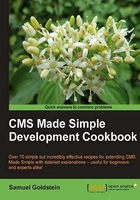
Introduction
If you're reading this book, you already know that CMS Made Simple is a powerful system for creating websites. Even the base install enables you to easily produce sites with many sophisticated features. There are times, however, when you need to be able to do things that are beyond the basic capabilities. You can often find pre-made extensions on the official CMS Made Simple sites: Tags and Modules in the Developer's Forge (or directly through the Module Manager), and examples of User-Defined Tags on Wiki or posted in the forum.
What are these different kinds of extension? This chapter will answer that question in greater detail. However, we will define them briefly here. All three types of extension share some things in common: they are PHP code which can be embedded in site pages, templates, or Global Content Blocks, or may be called by other code. A User-Defined Tag is distinct in that you can create and edit it through the CMSMS admin area. A Tag is similar, but must be placed as a file on your server, and provides more information to the site administrator. A module has available to it the rich functionality of the Module API, and enables the creation of much more complex applications.
As mentioned before, there is a wealth of pre-made extensions which are available to you. But even if these pre-made extensions don't meet your needs, all is not lost. You can jump in and create your own extensions! You will discover that the power of CMS Made Simple is only limited by your imagination.
Tip
In this chapter, we will learn how to approach the problem you're trying to solve. Is it something that can be solved without writing an extension? Would you be able to use or adapt an existing extension? If not, what conditions will the extension need to handle? The requirements that you think of will help you determine what kind of extension you should implement.
There are three recipes here that will help you to identify which kind of extension is appropriate for a given problem, and three recipes that go over the basics of creating each major type.